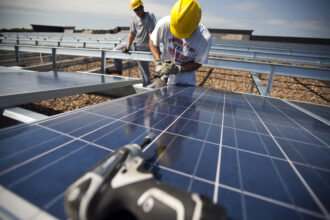Global Carbon Offset Investments Stalling (One World)
Global investments in projects that reduce greenhouse gas emissions are falling this year and will likely continue to decline as countries wait to negotiate a new climate change treaty in December.
India Opposes Carbon Storage as Climate Change Tool (Bloomberg)
India argues that CCS is not a proven technology and “it’s certainly not economically feasible.”
Obama Open to Discussion on CO2 Rules (Reuters)
President Obama hopes to get a climate change bill on his desk this year and is open to discussing how stringent the rules of carbon emissions trading should be , CEQ Chairwoman Nancy Sutley says.
Palin Changes Tune on Global Warming, But Not on Drilling (Los Angeles Times)
Alaska’s governor stepped away from past denials of global warming and told Interior Secretary Ken Salazar at an Anchorage hearing that natural gas could ease ‘the transition to green energy alternatives.’
U.S. Expected to Approve Higher Ethanol Blend (Reuters)
The U.S. government will eventually allow higher levels of ethanol to be blended into gasoline, the head of the Renewable Fuels Association says.
New Greenpeace Boss on Climate, Coal and Nuclear Power (Wall Street Journal)
A Q&A with Greenpeace USA’s new boss: 33-year old Phil Radford, whose embrace of both the familiar sidewalk membership drives and new technology as former head of organizing helped double the green group’s budget.
Toshiba Batteries Promise 90-Second Recharge (Business Green)
The Japanese company has improved its SCiB technology and aims to underpin emerging electric cars with speedy recharging capability.
Study: Massive Emissions Cuts Can Save Arctic Ice (AFP)
Cutting greenhouse gases by 70 percent this century would spare the planet the most traumatic effects of climate change, including the massive loss of Arctic sea ice, according to a new study.
California Seeks to Curb Appetite of Power-Hungry TVs (New York Times)
Estimating that televisions and their electronic accessories account for 10 percent of the electricity used in an average household, California’s energy wardens want to put new flat-panel models on a diet.
Spam ‘Uses as Much Power as 2.1M Homes’ (Guardian)
More than 80% of the world’s email traffic is now spam and the transmission and receipt of unwanted email gobbles up 33 billion kilowatt-hours of electricity a year.
Bill Gates Patents Electromagnetic Hybrid Engine (Tech Flash)
Bill Gates has always been fond of his cars, but new patent applications suggest Microsoft’s founding geek is becoming even more of a gearhead. One is for an electromagnetic combustion engine.
WWF Scotland Boss Calls for Penalizing Energy Wasters (The Herald)
Wasting energy is an "anti-social act" that should be viewed in the same way as drink-driving, the chief of WWF Scotland says.
No Shortage of Coal Cash for the CEO (AP)
The chairman and chief executive of coal miner Massey Energy Co. received compensation valued at $19.7 million in 2008, a 17 percent decrease from the previous year, corporate filings show.
Nottinghamshire Coal Plant Protest: The Activists’ Story (Guardian)
Two things are pretty clear: First, this climate movement is getting really big. Second, this was a pre-emptive strike against the whole movement. The idea is to head people off at the pass. But it won’t work.
About This Story
Perhaps you noticed: This story, like all the news we publish, is free to read. That’s because Inside Climate News is a 501c3 nonprofit organization. We do not charge a subscription fee, lock our news behind a paywall, or clutter our website with ads. We make our news on climate and the environment freely available to you and anyone who wants it.
That’s not all. We also share our news for free with scores of other media organizations around the country. Many of them can’t afford to do environmental journalism of their own. We’ve built bureaus from coast to coast to report local stories, collaborate with local newsrooms and co-publish articles so that this vital work is shared as widely as possible.
Two of us launched ICN in 2007. Six years later we earned a Pulitzer Prize for National Reporting, and now we run the oldest and largest dedicated climate newsroom in the nation. We tell the story in all its complexity. We hold polluters accountable. We expose environmental injustice. We debunk misinformation. We scrutinize solutions and inspire action.
Donations from readers like you fund every aspect of what we do. If you don’t already, will you support our ongoing work, our reporting on the biggest crisis facing our planet, and help us reach even more readers in more places?
Please take a moment to make a tax-deductible donation. Every one of them makes a difference.
Thank you,











